Abstract
OBJECTIVES: The purpose of this study was to monitor blood lead in a northern Swedish cohort of mothers and children during pregnancy and at birth. METHODS: Blood lead was analyzed during pregnancy and in the umbilical cords of 290 women living near a smelter and in 194 control subjects. RESULTS: During pregnancy, there were statistically significant overall increases in blood lead concentrations by 20% and 15% in the smelter and reference areas, respectively. Mean maternal blood lead concentrations at delivery were 0.15 mumol/L (3.11 micrograms/dL) in the smelter area and 0.13 mumol/L (2.69 micrograms/dL) in the control area. Umbilical cord blood lead levels were 80% to 87% of the maternal levels. Blood lead levels were influenced by place of residence, employment at the smelter, smoking, and wine consumption. Maternal serum calcium levels decreased during pregnancy and were significantly lower than those of the newborns. CONCLUSIONS: An increase in blood lead concentrations was found during pregnancy, despite increased blood volume and unchanged or decreasing environmental lead levels. The mobilization of lead from bone during pregnancy may explain the increase.
Full text
PDF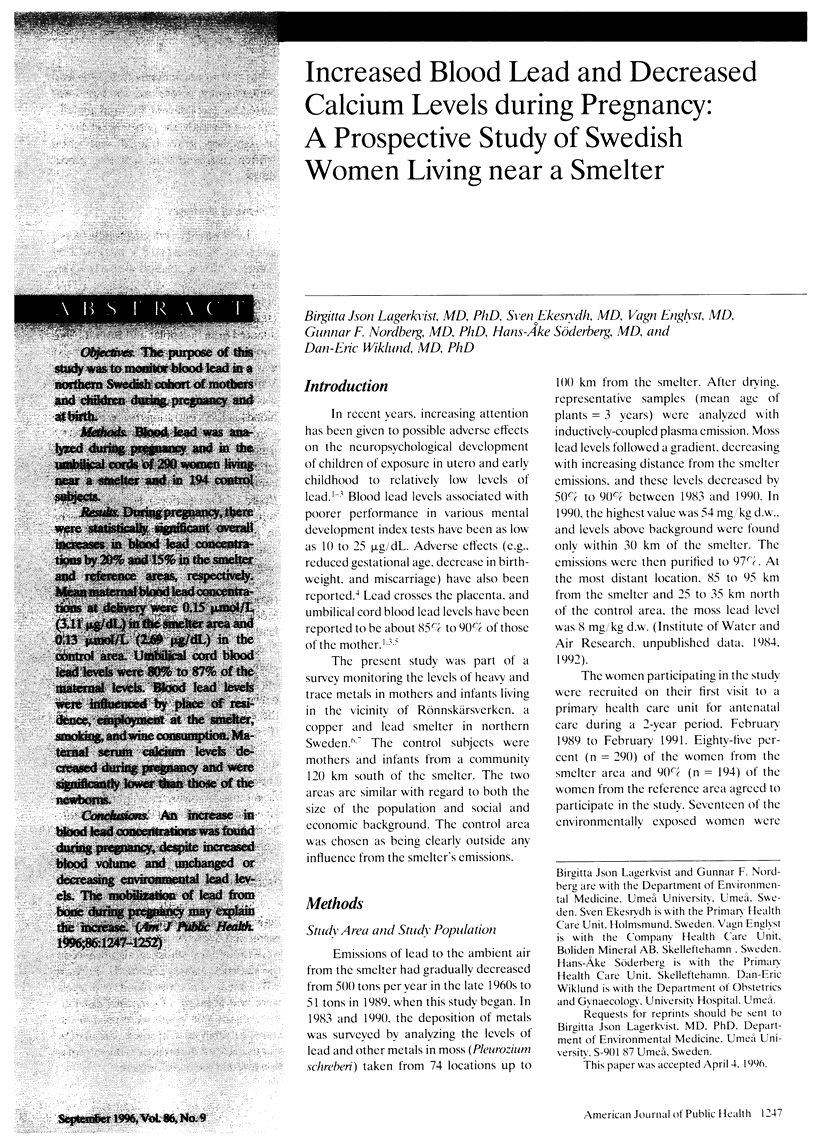
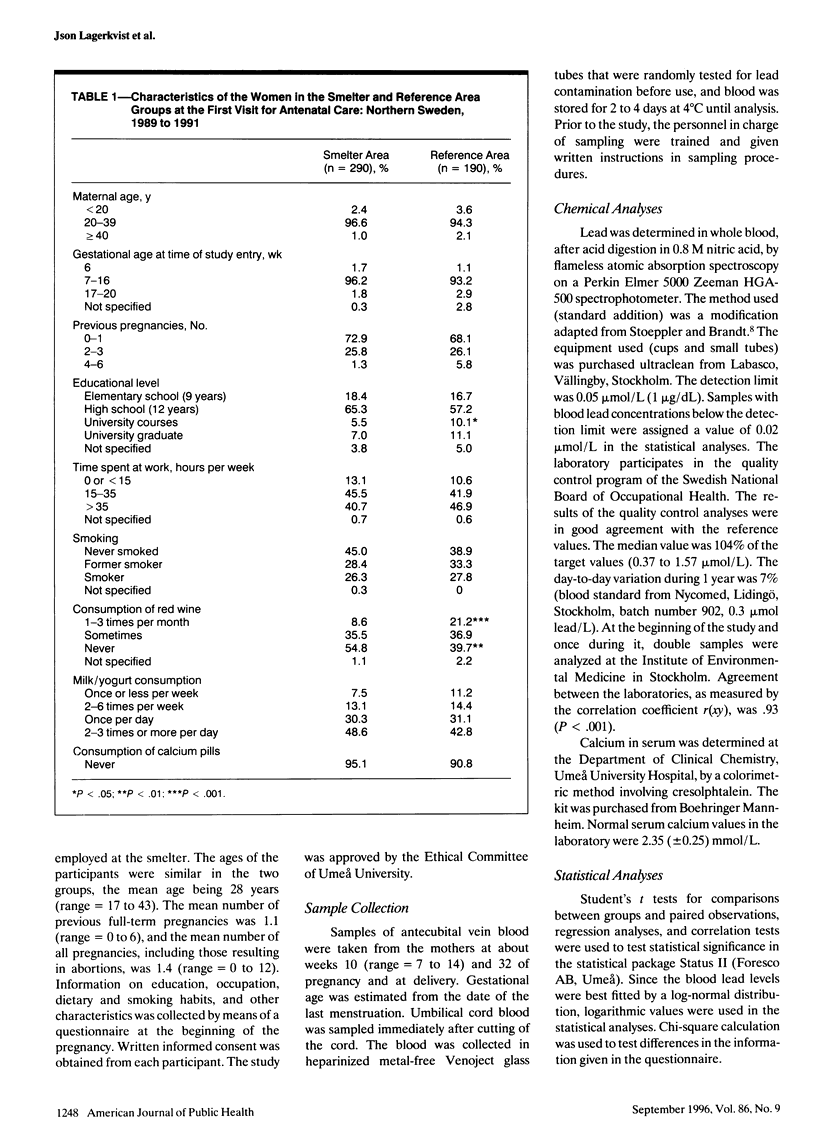
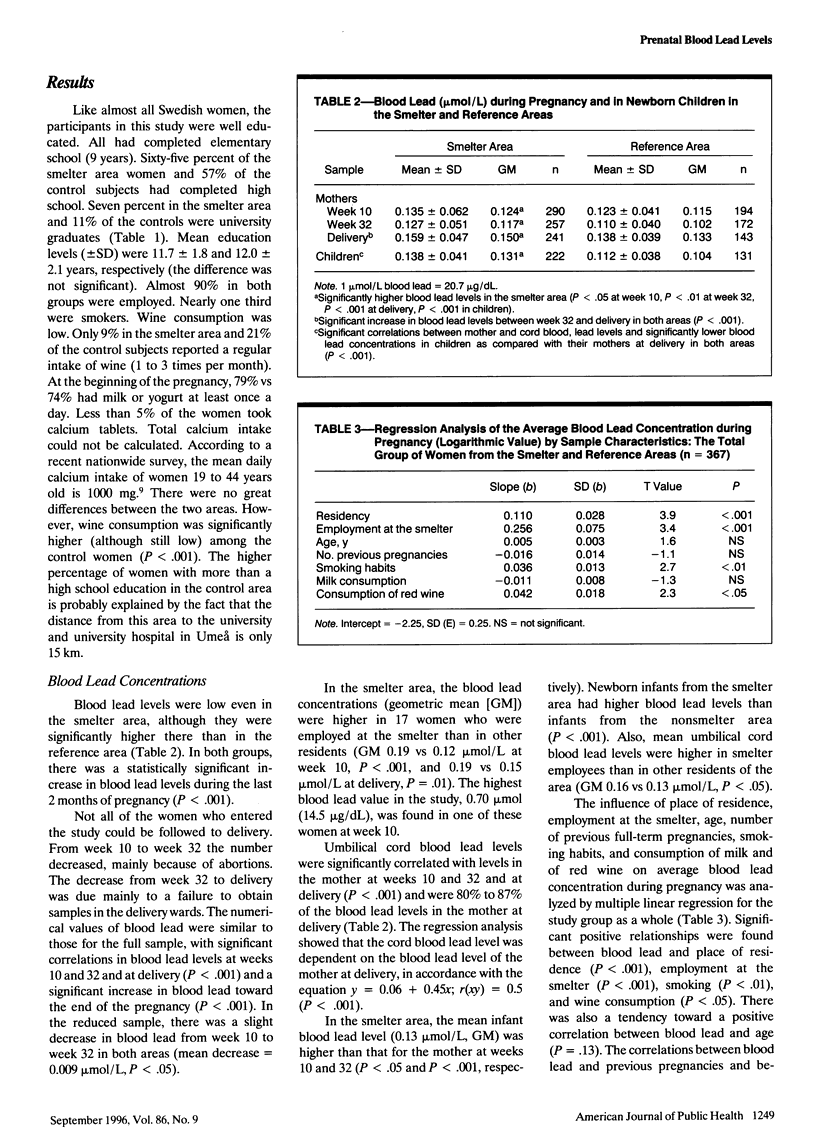
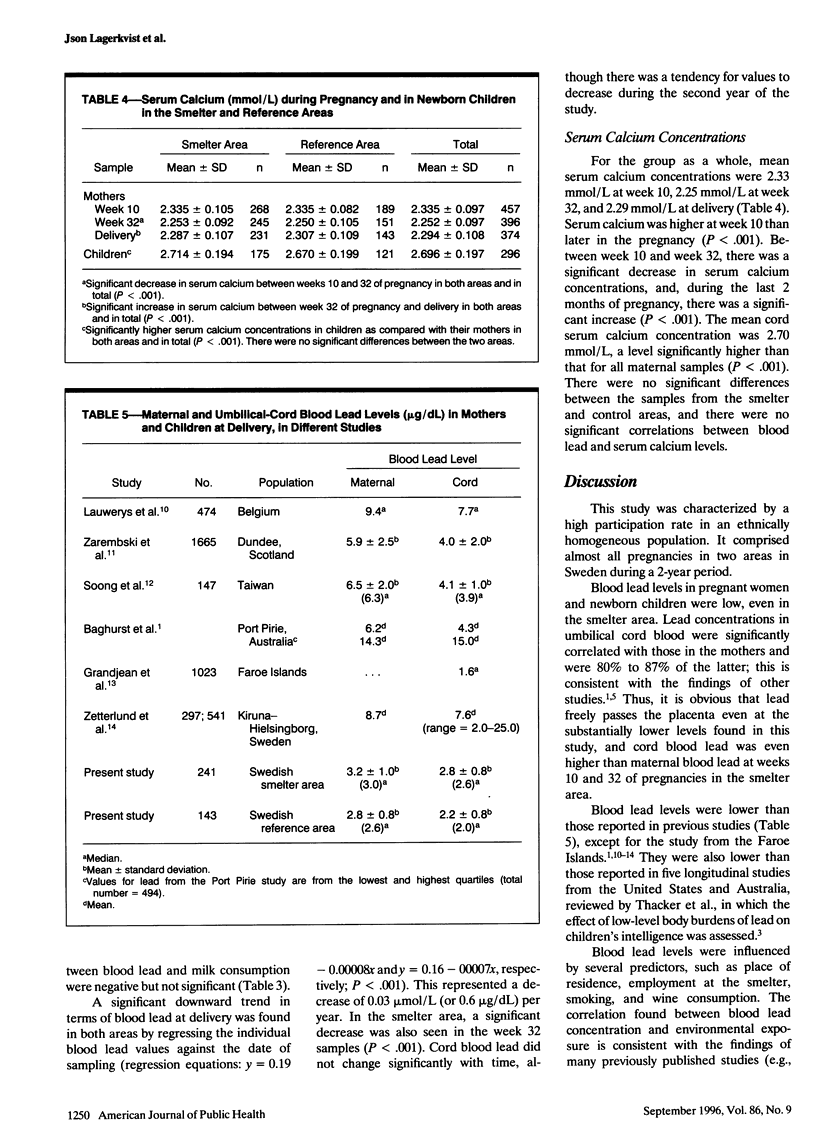
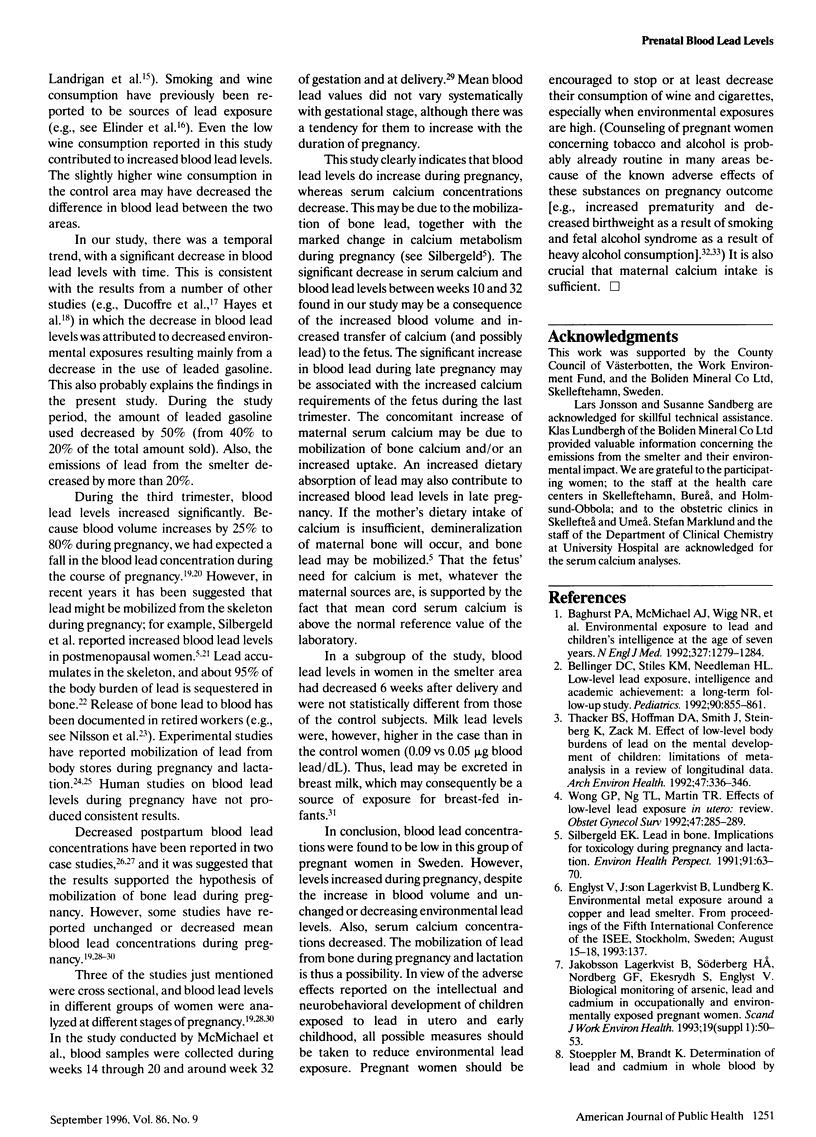
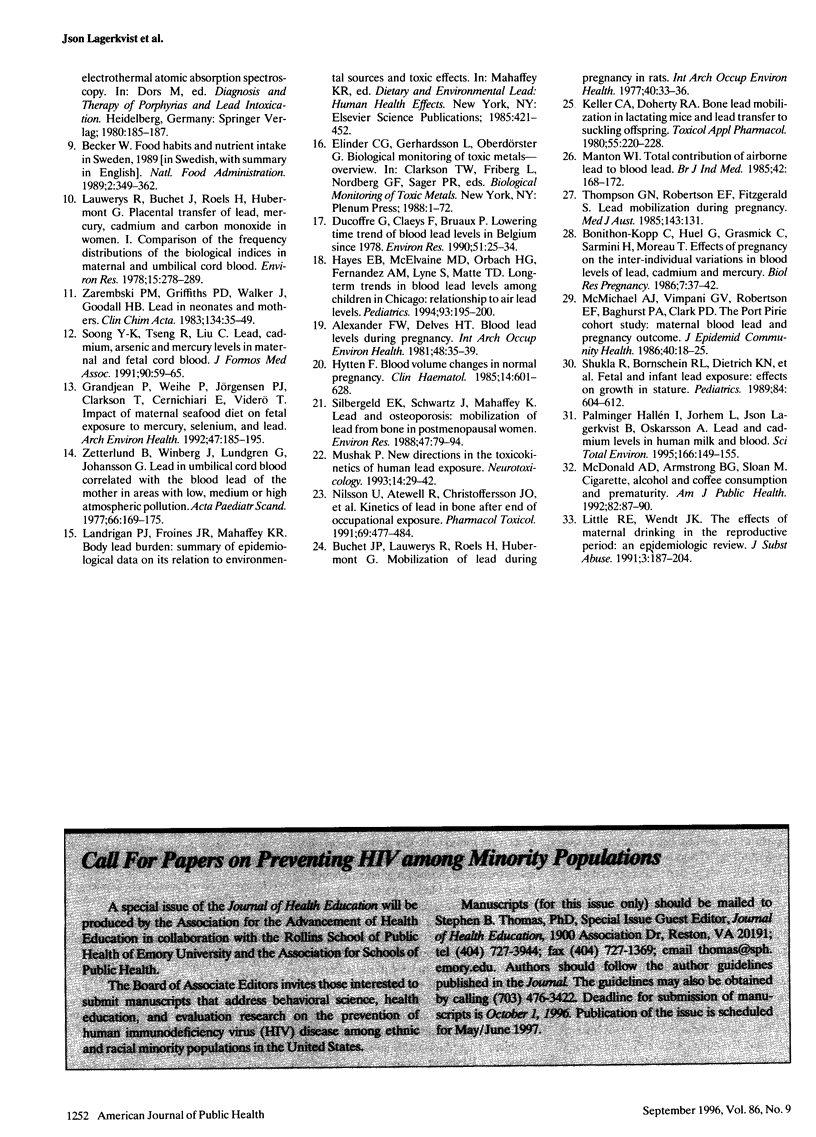
Selected References
These references are in PubMed. This may not be the complete list of references from this article.
- Alexander F. W., Delves H. T. Blood lead levels during pregnancy. Int Arch Occup Environ Health. 1981;48(1):35–39. doi: 10.1007/BF00405929. [DOI] [PubMed] [Google Scholar]
- Baghurst P. A., McMichael A. J., Wigg N. R., Vimpani G. V., Robertson E. F., Roberts R. J., Tong S. L. Environmental exposure to lead and children's intelligence at the age of seven years. The Port Pirie Cohort Study. N Engl J Med. 1992 Oct 29;327(18):1279–1284. doi: 10.1056/NEJM199210293271805. [DOI] [PubMed] [Google Scholar]
- Bellinger D. C., Stiles K. M., Needleman H. L. Low-level lead exposure, intelligence and academic achievement: a long-term follow-up study. Pediatrics. 1992 Dec;90(6):855–861. [PubMed] [Google Scholar]
- Bonithon-Kopp C., Huel G., Grasmick C., Sarmini H., Moreau T. Effects of pregnancy on the inter-individual variations in blood levels of lead, cadmium and mercury. Biol Res Pregnancy Perinatol. 1986;7(1):37–42. [PubMed] [Google Scholar]
- Buchet J. P., Lauwerys R., Roels H., Hubermont G. Mobilization of lead during pregnancy in rats. Int Arch Occup Environ Health. 1977 Oct 17;40(1):33–36. doi: 10.1007/BF00435515. [DOI] [PubMed] [Google Scholar]
- Ducoffre G., Claeys F., Bruaux P. Lowering time trend of blood lead levels in Belgium since 1978. Environ Res. 1990 Feb;51(1):25–34. doi: 10.1016/s0013-9351(05)80180-x. [DOI] [PubMed] [Google Scholar]
- Grandjean P., Weihe P., Jørgensen P. J., Clarkson T., Cernichiari E., Viderø T. Impact of maternal seafood diet on fetal exposure to mercury, selenium, and lead. Arch Environ Health. 1992 May-Jun;47(3):185–195. doi: 10.1080/00039896.1992.9938348. [DOI] [PubMed] [Google Scholar]
- Hallén I. P., Jorhem L., Lagerkvist B. J., Oskarsson A. Lead and cadmium levels in human milk and blood. Sci Total Environ. 1995 Apr 21;166:149–155. doi: 10.1016/0048-9697(95)04523-4. [DOI] [PubMed] [Google Scholar]
- Hayes E. B., McElvaine M. D., Orbach H. G., Fernandez A. M., Lyne S., Matte T. D. Long-term trends in blood lead levels among children in Chicago: relationship to air lead levels. Pediatrics. 1994 Feb;93(2):195–200. [PubMed] [Google Scholar]
- Hytten F. Blood volume changes in normal pregnancy. Clin Haematol. 1985 Oct;14(3):601–612. [PubMed] [Google Scholar]
- Keller C. A., Doherty R. A. Bone lead mobilization in lactating mice and lead transfer to suckling offspring. Toxicol Appl Pharmacol. 1980 Sep 15;55(2):220–228. doi: 10.1016/0041-008x(80)90083-6. [DOI] [PubMed] [Google Scholar]
- Lagerkvist B. J., Söderberg H. A., Nordberg G. F., Ekesrydh S., Englyst V. Biological monitoring of arsenic, lead and cadmium in occupationally and environmentally exposed pregnant women. Scand J Work Environ Health. 1993;19 (Suppl 1):50–53. [PubMed] [Google Scholar]
- Lauwerys R., Buchet J. P., Roels H., Hubermont G. Placental transfer of lead, mercury, cadmium, and carbon monoxide in women. I. Comparison of the frequency distributions of the biological indices in maternal and umbilical cord blood. Environ Res. 1978 Apr;15(2):278–289. doi: 10.1016/0013-9351(78)90104-4. [DOI] [PubMed] [Google Scholar]
- Little R. E., Wendt J. K. The effects of maternal drinking in the reproductive period: an epidemiologic review. J Subst Abuse. 1991;3(2):187–204. doi: 10.1016/s0899-3289(05)80036-7. [DOI] [PubMed] [Google Scholar]
- Manton W. I. Total contribution of airborne lead to blood lead. Br J Ind Med. 1985 Mar;42(3):168–172. doi: 10.1136/oem.42.3.168. [DOI] [PMC free article] [PubMed] [Google Scholar]
- McDonald A. D., Armstrong B. G., Sloan M. Cigarette, alcohol, and coffee consumption and prematurity. Am J Public Health. 1992 Jan;82(1):87–90. doi: 10.2105/ajph.82.1.87. [DOI] [PMC free article] [PubMed] [Google Scholar]
- McMichael A. J., Vimpani G. V., Robertson E. F., Baghurst P. A., Clark P. D. The Port Pirie cohort study: maternal blood lead and pregnancy outcome. J Epidemiol Community Health. 1986 Mar;40(1):18–25. doi: 10.1136/jech.40.1.18. [DOI] [PMC free article] [PubMed] [Google Scholar]
- Mushak P. New directions in the toxicokinetics of human lead exposure. Neurotoxicology. 1993 Summer-Fall;14(2-3):29–42. [PubMed] [Google Scholar]
- Nilsson U., Attewell R., Christoffersson J. O., Schütz A., Ahlgren L., Skerfving S., Mattsson S. Kinetics of lead in bone and blood after end of occupational exposure. Pharmacol Toxicol. 1991 Jun;68(6):477–484. doi: 10.1111/j.1600-0773.1991.tb01273.x. [DOI] [PubMed] [Google Scholar]
- Shukla R., Bornschein R. L., Dietrich K. N., Buncher C. R., Berger O. G., Hammond P. B., Succop P. A. Fetal and infant lead exposure: effects on growth in stature. Pediatrics. 1989 Oct;84(4):604–612. [PubMed] [Google Scholar]
- Silbergeld E. K. Lead in bone: implications for toxicology during pregnancy and lactation. Environ Health Perspect. 1991 Feb;91:63–70. doi: 10.1289/ehp.919163. [DOI] [PMC free article] [PubMed] [Google Scholar]
- Silbergeld E. K., Schwartz J., Mahaffey K. Lead and osteoporosis: mobilization of lead from bone in postmenopausal women. Environ Res. 1988 Oct;47(1):79–94. doi: 10.1016/s0013-9351(88)80023-9. [DOI] [PubMed] [Google Scholar]
- Soong Y. K., Tseng R., Liu C., Lin P. W. Lead, cadmium, arsenic, and mercury levels in maternal and fetal cord blood. J Formos Med Assoc. 1991 Jan;90(1):59–65. [PubMed] [Google Scholar]
- Thacker S. B., Hoffman D. A., Smith J., Steinberg K., Zack M. Effect of low-level body burdens of lead on the mental development of children: limitations of meta-analysis in a review of longitudinal data. Arch Environ Health. 1992 Sep-Oct;47(5):336–346. doi: 10.1080/00039896.1992.9938372. [DOI] [PubMed] [Google Scholar]
- Thompson G. N., Robertson E. F., Fitzgerald S. Lead mobilization during pregnancy. Med J Aust. 1985 Aug 5;143(3):131–131. doi: 10.5694/j.1326-5377.1985.tb122859.x. [DOI] [PubMed] [Google Scholar]
- Wong G. P., Ng T. L., Martin T. R., Farquharson D. F. Effects of low-level lead exposure in utero. Obstet Gynecol Surv. 1992 May;47(5):285–289. doi: 10.1097/00006254-199205000-00001. [DOI] [PubMed] [Google Scholar]
- Zarembski P. M., Griffiths P. D., Walker J., Goodall H. B. Lead in neonates and mothers. Clin Chim Acta. 1983 Oct 31;134(1-2):35–49. doi: 10.1016/0009-8981(83)90182-1. [DOI] [PubMed] [Google Scholar]
- Zetterlund B., Winberg J., Lundgren G., Johansson G. Lead in umbilical cord blood correlated with the blood lead of the mother in areas with low, medium or high atmospheric pollution. Acta Paediatr Scand. 1977 Mar;66(2):169–175. doi: 10.1111/j.1651-2227.1977.tb07829.x. [DOI] [PubMed] [Google Scholar]


